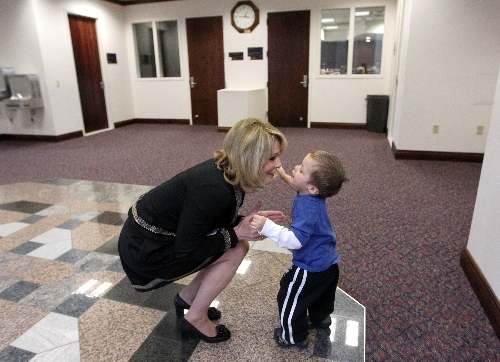Bills address autism services, funds
CARSON CITY -- Testifying before the Legislature on funding for autism services was a herculean effort Wednesday for Reno mother Sherrie Olson.
Her 2-year-old son, A.J., wearing a Superman T-shirt, screamed and writhed in her arms. He tried to run out of the hearing room and ride the elevators up and down. He didn't speak or listen to the people around him.
It's just an ordinary day for a parent of a child with autism.
"It's the best feeling ever when you get hugs from him rather than just screaming," Olson said.
Nevada legislators heard three bills that would rework the state's autism services and replenish funding at the same time federal money and state general funds are drying up.
Assemblywoman Melissa Woodbury, R-Las Vegas, co-sponsored Assembly Bill 315, which would create a single umbrella for the state's three existing autism assistance programs.
Assembly Bill 316 would establish a standardized screening system that would allow the state to determine how many Nevadans have autism.
Assemblyman James Ohrenschall, D-Las Vegas, is co-sponsoring Assembly Bill 345, which would make a $1.5 million appropriation to fund autism programs. A budget committee would have to approve the extra money even if the bill passes the Assembly Health and Human Services Committee because the funding is not included in Gov. Brian Sandoval's proposed budget.
The three existing state funding streams support about 398 children, and at least 349 children are on the waiting list. If AB345 passes, all the children on the waiting list will receive services.
Parents whose children are on the waiting list testified that their children suffer and regress as long as they don't receive treatment. Autistic children who get treatment at a young age, however, can become functioning adults.
One 16-year-old boy with autism testified Wednesday that his IQ score was in the 70s when he was a child. Now an articulate high school student in Las Vegas, he was appointed the historian of his Boy Scout troop and is close to achieving his Eagle Scout rank.
Olson has tried many therapies and drained much of her pocketbook while A.J. has been on the waiting list. The medical problems that accompany his autism complicate the situation.
"We had to choose between paying his hospital bills and his therapy bills," Olson said.
A.J. was accepted to the state autism treatment assistance program a few weeks ago, but Olson described the emotional roller coaster of not knowing whether the funds would come through to keep the program in place.
She pleaded with legislators to help families such as hers cope with the constant battle of a toddler with autism. With help, she said, A.J. might someday be able to point or say a few words rather than communicating by biting her.
"It's extremely hard. It's exhausting," said Olson, whose youngest son is not autistic. "But I'm grateful each day for both of my children, and there's nothing more rewarding than having them."






















